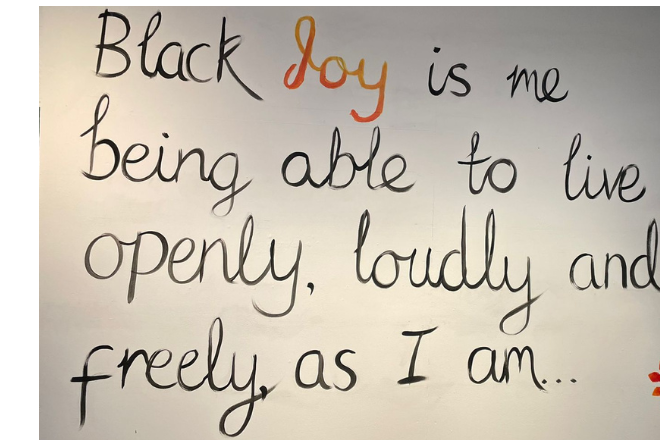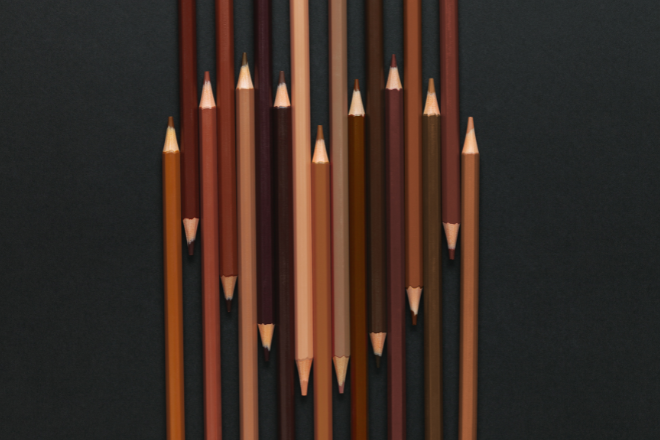Navigating how to include young people meaningfully as co-researchers is like taking part in an Escape Room. Adapting to changing circumstances comes with its challenges, maybe times of considered defeat, but also many moments of laughter.
Disclaimer: This blog is a long read. At the bottom of this blog you will find the team’s key learning points which are well worth a read!
Meet The Team
This blog shares experiences from a PhD research project that involves young people as co-researchers throughout the various stages of research. The blog itself has been collaboratively written by all four members of the research team and we have also been supported by a wonderful academic supervisory team throughout the life of our project.
Hi, I’m Jess, a co-researcher on the project. I’m currently in my second year studying Psychology at Aberdeen University. I got involved in this research as I have experience of mental health stigma and discrimination and I am passionate about amplifying young people's voices in research. In this role I ensure that there is a consistent lived experience voice throughout every decision made on the project.
Hiya, I am Kirsty, an undergraduate psychology student at Queen Margaret University with ambition to pursue a career working within the mental health field. I am a young person with lived experience who has encountered mental health related stigma first-hand, which passionately fuels my interest in the area. My role as a co-researcher on this PhD research project involves: learning more about the research process, providing a youth-focused lens when analysing the data, and using my own lived experience understanding of mental health related stigma to steer this research in the appropriate direction.
Hi there, I am Rhi and I’m actually not a student! I got my first job at the age of 14 and have been working a multitude of jobs ever since. This experience gives me a different perspective than the rest of the team as it allows me to bring knowledge on young people’s stigma experience in the workplace from a young age. I’m involved in this research because I don’t think there is enough young people’s voice on matters like this and I want to be part of bringing change to future young people like me.
Hello! I’m Rebecca, a second year PhD candidate at Glasgow Caledonian University. Having over 3 years of third sector and youth work experience, my work has often focused on the mental health and wellbeing of young people, with an emphasis on amplifying the voices of lived experience. I have fostered the participatory approach throughout this project as I believe that the meaningful inclusion of young people in decisions that affect them is vital to improving the outcomes of research.
As a research team, we have developed a strong, relationship-focused way of working that places the wellbeing and inclusion of each member of the team front and centre and this creates a safe and comfortable working environment for us to design and conduct participatory, youth-led research. This was crucial, as the field of mental health stigma is sorely lacking the voice of young people and no participatory research has been conducted with young people in this field to date.
Our research project explores how children and young people, aged 12-17, experience stigma in relation to their own poor mental health. The project is funded by The Mental Health Foundation and Glasgow Caledonian University. The co-researchers were recruited from volunteers at See Me Scotland, where the lead researcher had previous engagement and existing relationships with young people. See Me Scotland also continued to provide additional support to the young people in their role as co-researchers: additional well-being check-ins during the project, a risk assessment in place for involvement, and a key allocated staff member to support the project.
Recruitment began with a brief description of the research project and after an initial expression of interest, a drop-in presentation session was held to present the research project. If the young people were still interested in pursuing the co-researcher position, a one-to-one meeting was scheduled with the lead researcher. This meeting was designed to discuss their interests, what they would like to gain from the role, their availability, working style and any other needs alongside safeguarding methods and potential triggers. This allowed each co-researcher to collaboratively design their role description based on their interests and needs, leading to a jointly designed working agreement signed by the lead researcher, co-researcher, and See Me Scotland.
‘… contributing to 'actually what is it that I'm gonna do', like 'what is the role' - it was the foundation for all the rest of it. I feel equal, I feel I've contributed. That was the best decision made so far. Was being able to actually go 'yeah, as a co-researcher that responsibility works but that one, nah, that one doesn't tickle my fancy.' And the fact that that was okay? It makes the experience so different to any other. In a good way!’ - Kirsty
Beginning the work
Once the co-researchers were officially recruited onto the project, a welcome pack was put together that included notebooks, a journal, pens, highlighters, some well-being items, and a welcome letter. This had been discussed in the initial meeting with the interested young people to identify what would be most appropriate things to receive, if a welcome pack was possible. The first meetings were based on everyone's availability and focused on establishing best ways of working. The co-researchers identified the key areas they wanted to start working on such as understanding the research area, the theory and background, and designing our initial study. The lead researcher supported the co-researchers to become familiar with these areas, as well as getting the co-researchers access to an institutional email, introducing them to the projects supervisory team, scheduling a team building session, and setting up our working patterns.
Designing our first study began by working our way through our research aims and the existing research, and considering what our research questions needed to look like. Our ethics application was fully co-designed and included participant documentation, recruitment advertisements, interview schedules, interview vignettes, participant distress protocol and signposting for participants. This process took place over several weeks, through group calls and online group design sessions.
'Initially I thought the ethics would be daunting and that, but the way you broke it down to make it like smaller chunks made it so much easier... wee small digestible bits, made it easy.’ Rhi
Our first study has now been launched and is publicly recruiting children and young people. Each interview involves both the lead researcher and a co-researcher. Data analysis is being conducted collaboratively to ensure that youth voice and lived experience is carried throughout all stages of research. Throughout it all, relationship management remained a priority by putting in place wellbeing check-ins at the start of all meetings, providing support with non-research related commitments (CV writing, interview prep, university assignments), and reliable communication via a platform selected by the co-researchers. The process is continually evolving, as is essential in any work with young people. As a team, we closely align with YouthLink Scotland’s key principles.
Key learning points
1. Cultivating strong relationships. Take a 'relationship first, work second' approach that ensures a pressure-free environment to being involved in research. Icebreaker activities at the beginning of meetings and co-creating our team motivations is a great start. Be transparent about every step, even if there are occasions where they can't be involved in decisions.
2. Work is not more important than the wellbeing of team members. Get to know everyone in the research team, moving beyond just names and interests but further into individual ambitions and personalities. Sometimes, this can even involve forfeiting work to build these strong relationships, to ensure that wellbeing truly is first and foremost. Relationships require consistency and accountability, so ensure words and promises turn to action. Always ask and never assume that you know what co-researchers need to know, or they should be doing. Promote an authentic lived experience voice throughout the research process, without forcing it.
3. Remain flexible to young people’s schedule. Commit to creating a shared way of working, which might include unusual working patterns and using alternative communication methods. A group chat on Facebook, for example, can ensure that the team is regularly updated, well in advance of project tasks. Remember that young people are working just as hard to accommodate the academic practice or working commitments into their lives as any researcher. Stay open and adaptable to change, using techniques like Meltdown Monday which involves each member of the team taking time to vent or moan about frustrations in and outside of the research project. Recognise and challenge unequal power dynamics between adults and young people, to ensure their voice and contribution is consistently valued and centred throughout the process.
4. Become a Research Team. While other tips we have provided may seem easier to grasp, becoming a true research team is the most important of all. To embody this idea, it is vital that before undertaking participatory work, you view young people and their contribution as equally as valuable as your own. To ensure you have the right mentality, you must go beyond simply understanding the rationale of using participatory techniques. You need to truly spend time recognising how important and how truly valuable young people's voice, time and commitment is to the work you are doing. Only once you feel truly grateful for their involvement, truly consumed by the magnitude of their input, can you become a research team. That recognises and values each individual members contribution, which in many ways will look very different from your own contribution, but is valuable and important, nonetheless.
‘The co-researchers aren't add-ons, they are integral members of the research team.’ Jess
Our Last Message
‘Participatory research is extremely important because young people are the future minds of the world. Making their input at the heart of the research is inclusive and empowering is almost the most important thing that you can do. Getting this right may be difficult at first but it will be so crucial to developing research that can be beneficial for future generations.’ Jess
'This project allows me to ensure minority and marginalised groups are listened to, because I myself know what it feels like to not be heard and I want every young person to know they have a voice' Rhi
‘The inclusion of young people is incredibly valuable because we have an insight that you don’t. And, we will make you question and further contemplate things that you wouldn’t/may not otherwise consider. We come with a whole new (invaluable) perspective.’ Kirsty
‘Working with children and young people as co-researchers ensures that you are constantly challenged in your research practice and remaining true to the population you are ultimately aiming to benefit. While I grow tired and frustrated with many elements of a traditional PhD, I find myself consistently revitalised with the participatory element of this research. It also reminds you to always consider young people as whole beings with intricate and complex lives. In this project, I have been consistently reminded of why this research is so important, by the very presence of those who conduct it with me.’ Rebecca
Get involved
We hope you find this blog useful and that maybe you feel more confident to try conducting participatory research or work that includes young people’s voice in your projects! If you have a co-production story to share, please get in touch with us (coproduction@ucl.ac.uk), we would love to hear it!





.png)

.png)
.png)


.png)
.png)
.png)